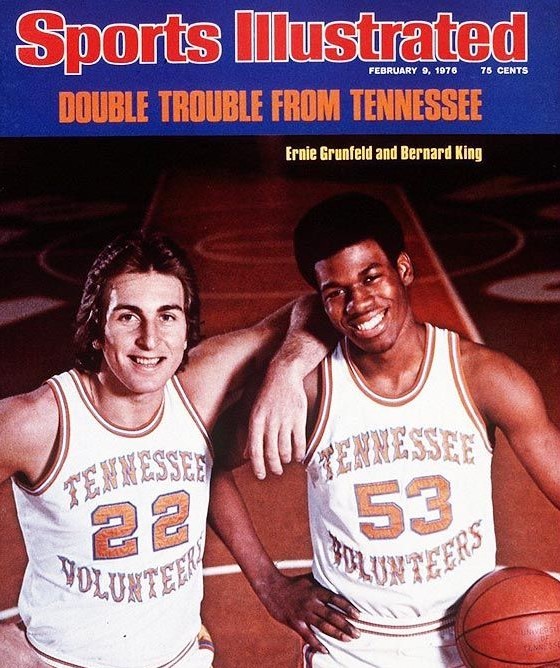News of Bernard King leaping toward the big screen triggered some interesting reactions.
There was minimum debate about whether he is Tennessee’s best-ever basketball player. Was he the best-ever in the SEC? Several readers asked who was second-best for the Volunteers. I’ll give that some more thought.
There were questions from fans that came in late about how King, a trim 6-7 forward, not a big bruiser, could get so many rebounds. He gathered 1,004 in 76 games for the Volunteers.
Bernard’s average, 13.2, was second best in school history to Gene Tormohlen’s 16.9. The man they called Bumper, big and powerful, 6-8 and 230, persuaded some rivals to give him space. Some he knocked out of the way.
Bernard beat rebounding competition with quickness, smart positioning, excellent leaping ability, impeccable timing and fierce determination.
There were questions about King’s relationship with Ernie Grunfeld and King’s interaction with coach Ray Mears. Yes, Bernard really did stop the team bus to run inside a drug store to buy batteries for his music machine. Mears was stunned.
A prominent attorney asked the most penetrating question, how in the world did Stu Aberdeen convince Grunfeld and King, all-New York City superstars in high school, to come to Tennessee? Did he cheat?
I don’t think so.
Much of what I know about the recruitment of Grunfeld came from Ernie. I visited his high school and the playground where he grew up. I was in the Grunfeld home to see his collection of trophies and medals.
I know his parents were very impressed by a move Tennessee made when Ernie visited UT. Business leaders from the Jewish community were invited to dinner with the very special guest. Ed Balloff explained that they all believed Grunfeld would have a career in basketball but if he didn’t, they could offer him a career in Knoxville.
The conversation went around the room as each briefly explained what he did for a living. The summation was Ernie could take his choice of job offers.
To the Grunfelds, this was a security blanket that made sense. That he never needed it was the way it was supposed to work.
If there were NCAA contact limitations back then, Stu no doubt violated them. I have absolutely no reason to believe he could have bought Grunfeld. The family wasn’t rich but it had a solid business, cloth and dry goods, and dignity and pride.
The recruitment of Bernard was easier. There was less competition. Most college coaches did not think he would qualify academically. Tom Konchalski was the secret weapon. He had played for Stu at Acadia University in Wolfville, Nova Scotia. He lived in New York. He had helped in the recruitment of Grunfeld. He knew Ken Kern, King’s coach at Fort Hamilton. He went out of his way to get acquainted with Bernard.
Konchalski opened the door for Tennessee. When Bernard asked Kern what he thought, the coach validated what Konchalski had said.
Kern believed King’s academic average would meet the 2.0 requirement and convinced Aberdeen to go for it. Kern knew about the official grade book and the famous coffee stain that partly covered a D or a B. That’s how close Bernard was to not qualifying for a scholarship.
That Grunfeld was already at UT was relevant. Aberdeen’s persistence was the winning edge. Even if he had wanted to offer illegal inducements, he didn’t have the loot. Bob Woodruff hounded Stu about how much time he was spending in New York and how much it was costing Tennessee in hotel and restaurant bills.
Had there been a big bag of green, Stu would have dipped in, paid down the deficit and calmed the athletics director’s concerns.
To maintain pursuit, Aberdeen ended up sleeping on living room couches. Mears ended up in a serious battle with Woodruff about the basketball budget. That argument ended in the office of Dr. Edward J. Boling, UT president.
Mears remained Tennessee’s coach.
I never thought King had all that many choices. He visited Arizona State, his first flight. Dayton and Marquette expressed interest. Stu thought Syracuse might be a threat.
Tennessee did a great job when the prize recruit came to town. The big banner proclaimed “Bernard King Day.”
And what a show it was – flashing lights, police escort from the airport, Hyatt Regency, football full house and a lot of noise when Bernard was introduced at Neyland Stadium. He cancelled a proposed visit to Marquette.
Stu’s second-best sales job was convincing UT admissions that King’s transcript was valid. Indeed, it proved to be.
Marvin West welcomes comments and questions from readers. His address is marvinwest75@gmail.com.

